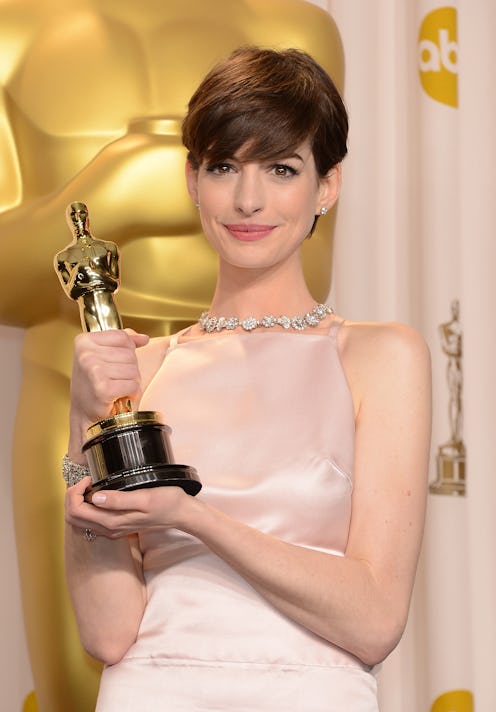When Anne Hathaway won the Oscar for Best Supporting Actress in 2013, she seemed thrilled — giddy even. After receiving her golden statue and stepping up to the mic, she let out a sweet expression of awe: "It came true." And that's pretty much when the public at large turned against her. Leading up to her Oscar win, there was already a growing hate for Hathaway among pop culture enthusiasts. Her big smile and sweet interview style felt fake to some, causing many to criticize her for being inauthentic. Now, almost four years later, she's admitted that she was being inauthentic, but not for reasons one might think. In a recent interview, Hathaway said she wasn't really happy when she won her Oscar; she just acted the way she felt people wanted her to act.
"I felt very uncomfortable,"she said of her Oscar moment in a new interview with The Guardian. Hathaway, who won the award for her heartbreaking performance as Fantine in Les Misérables, added that she was still feeling the after-effects of playing such a tortured character. "I kind of lost my mind doing that movie, and it hadn't come back yet." But, the actress, knowing that she was expected to be happy on her big night, kept her smile big and her eyes wide. "I had to stand up in front of people and feel something I don't feel, which is uncomplicated happiness."
So, you were right, Hathahaters. She was forcing her happiness a little bit. But, guess what? That's human. It's not that Hathaway wasn't happy that she had won, but that winning the Oscar didn't immediately make all her other, perhaps more subdued, emotions disappear. "It's an obvious thing, you win an Oscar and you're supposed to be happy. I didn't feel that way," she continued. Looking back, the actress believes that part of the Hathahate she received was a reflection of her act. "I tried to pretend that I was happy and I got called out in it, big time," she said. (It's worth pointing out that, even if that's partially what led to people thinking she wasn't being authentic enough, she still didn't deserve such brutal treatment.)
By admitting she wasn't 100 percent happy to be standing up on that Oscar stage, she is risking a lot. For those who still haven't let go of their inexplicable hatred of Hathaway, this might just be another strike against her. In fact, that's no doubt why she felt she had to pretend in the first place. Hathaway has, like so many women before her, found herself in a lose-lose situation. If she shows real, human emotion, she runs the risk of people calling her ungrateful. But, if she hides her emotion, people call her fake. It's the kind of Catch-22 we've grown accustomed to seeing lobbied over at Presidential candidate Hillary Clinton, who, just this week, was hit with a headline from The Daily Mail that read, "Could Hillary's smile cost her the election?" Society wants to see women express emotions, but only in a way that is deemed acceptable or normal.
It's inspiring to see that Hathaway has moved beyond the impossible pressure to have the "right" emotions in the public eye. By being honest about her feelings, hopefully she can teach us a thing or two about holding others to arbitrary standards — especially when it comes to how someone expresses or experiences emotions. At the very least, I hope her honesty inspires fans to own their emotions while inspiring haters to get over it and leave her alone. It's time we all just let Hathaway be Hathaway.
